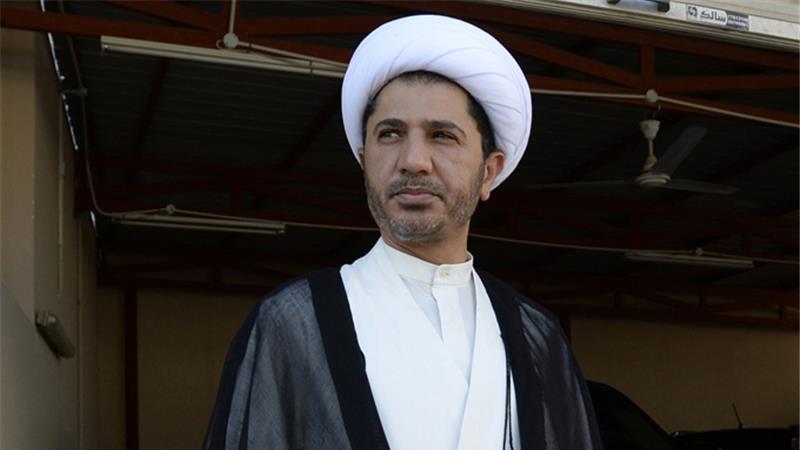Bahrain’s Public Prosecution presented its argument in the new case against arbitrarily imprisoned opposition leader Sheikh Ali Salman today, 8 March 2018, calling for the “maximum penalty” to be imposed on the politician and his two in absentia codefendants, Sheikh Hassan Ali Juma Sultan and Ali Mehdi Ali Al Aswad. The three men – all leading figures in the now-dissolved Al-Wefaq National Islamic Society, Bahrain’s largest political opposition group – could face capital punishment if the High Criminal Court decides in favor of the Public Prosecution’s allegations that they conspired with Qatar to overthrow the kingdom’s rulers in 2011. After hearing today’s arguments, the High Criminal Court adjourned the trial to 22 March 2018 in order for the defense to present its case.
Sheikh Salman, the only defendant presently detained, was originally arrested in December 2014 and ultimately sentenced to four years in prison on charges of “inciting disobedience and hatred in the kingdom” for giving speeches in his capacity as Al-Wefaq’s Secretary-General. In November 2017, the government abruptly brought this new set of charges against Sheikh Salman, accusing him and his fellow Al-Wefaq members of a variety of offenses including “divulging defence secrets to a foreign country, accepting money from a foreign country for providing it with military secrets and details pertaining to the internal situation and disseminating erroneous and false information and allegations abroad in order to weaken financial trust in the Kingdom and undermine its prestige [sic].” The charges appear to stem from a mediation attempt originally launched by the United States during the 2011 unrest, which resulted in preliminary communications between Qatar – as a potential mediator – and the Bahraini government and opposition. While this brief process was open and well-documented by the Bahrain Independent Commission of Inquiry (BICI), the Bahraini government has now raised the seven-year-old accusations after joining Saudi Arabia, the United Arab Emirates, and Egypt in a diplomatic dispute with Qatar beginning in June 2017.
In today’s hearing, the Public Prosecution described the defendants as “evil…traitors” that “sold out the nation for the sake of a fake leadership,” before bizarrely suggesting that they were in fact unaware of the true nature of the offenses when they allegedly committed them: “When traitors are called by their own country and leaders, they reject the call, but when they are called by the forces of evil, they respond. Such forces give traitors the illusion they are leaders, welcome them ceremoniously and encourage their treason. However, deep inside, the evil forces are mocking them for they see them only as servants and tools to carry out their destructive plans. Once their role is over and they are of no use, they are dismissed. They end up lost, stranded and bound to the garbage heap of history.” The Public Prosecution also explicitly accused the Qatari media outlet Al Jazeera of serving as a “propaganda trumpet” that not only incited “sedition and vandalism,” but actually broadcast guidance in how to commit “acts of sabotage” and target security forces in Bahrain.
In conclusion, the Public Prosecution called for the “maximum penalty against the accused.” While the official statement of the Advocate General does not explicitly detail which punishments are sought, the maximum penalty for the charges is death.
The United Nations Working Group on Arbitrary Detention (WGAD) has already declared that Sheikh Ali Salman is arbitrarily detained for exercising his right to free expression in relation to his peaceful political activism. That he is now at risk of continued imprisonment or even the death penalty constitutes clear reprisal for his opposition political views, and if the Bahraini government takes these actions it will be in flagrant violation of international law.
Moreover, the case comes during a wider assault on political opposition ahead of the 2018 elections for Bahrain’s lower house of parliament. On 19 February, Bahrain’s highest court confirmed the arbitrary July 2016 dissolution of Al-Wefaq and, in 2017, the government forcibly dissolved Wa’ad, the largest secular leftist society. Following the early closure and judicial harassment of other groups like Amal and Al-Wahdawi, there are effectively no major opposition groups operating independently in Bahrain. Moreover, the authorities indefinitely suspended Bahrain’s only independent newspaper, Al-Wasat, ultimately forcing it to close in 2017. Such actions have resulted in the near total closure of political and civic space in Bahrain.





